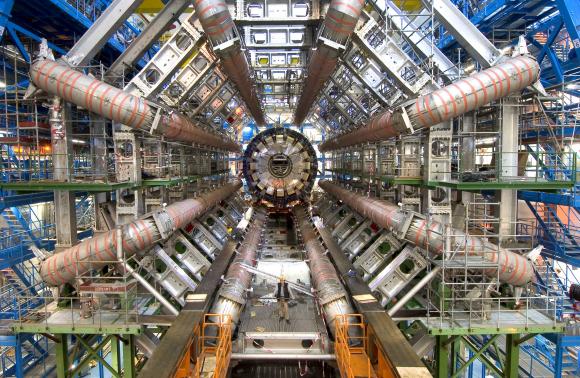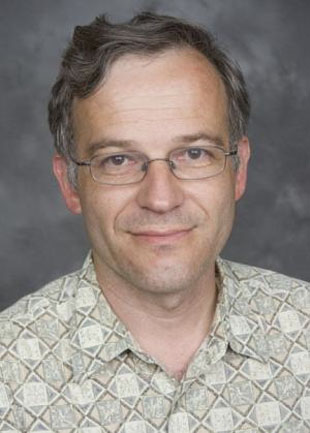PROVIDENCE, R.I. [Brown University] — 2010 promises to be an eventful year in physics, and Brown University faculty are intimately involved in what may be history-making experiments.
If all goes as planned, the Large Hadron Collider, the world’s largest particle accelerator, will play host to proton collisions at energies high enough to give scientists a peek at how the universe formed less than a millionth of a second after the Big Bang. Physicists around the world hope the experiments will answer elemental questions surrounding the origins of the universe, the composition of unseen matter and energy, and theories underpinning the current standard model of the known particles.
The first major experiments at the LHC are scheduled for the first quarter of 2010, at a collision energy of 7 teraelectronvolts (TeV). Brown faculty are experts in the LHC and will be working at the European Organization for Nuclear Research (CERN) in Geneva, where the collisions will take place.
For additional information or to arrange interviews with Brown physicists, contact Richard Lewis at (401) 863-3766 or by email.
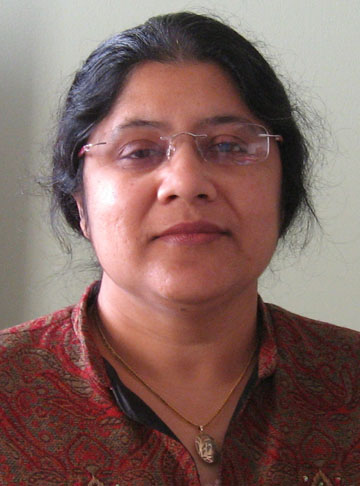
Associate Professor of Physics
Narain is an experimental physicist who will be working on the Compact Muon Solenoid (CMS) detector at the LHC. As she told PBS’s Nova program, “The LHC will give us that evidence needed to really understand what the state of the universe was after the Big Bang.”
At CERN, Narain is co-leading the group that aims to uncover a signal for a neutral heavy gauge boson, which is anticipated by models for physics beyond the Standard Model such as SUSY, extra dimensions, Little Higgs and Technicolor. Narain is also co-leading a working group at Fermilab’s LHC Physics Center that is investigating physics processes that include charged leptons, hadronic jets, and missing energy in their final state.
Narain was instrumental in the discovery of the top quark in 1995 through the D-Zero experiment at Fermilab. Last year, she played a key role in observing particle collisions that produce a single top quark, one of the fundamental constituents of matter. More ...
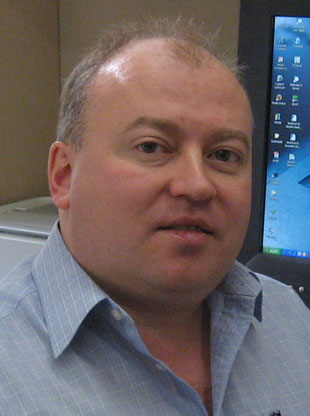
Professor of Physics
Landsberg served as the U.S. physics coordinator for the Compact Muon Solenoid (CMS) experiment. He is interested primarily in the search for new physics beyond the Standard Model of particle interactions.
At CERN, Landsberg is a convener of the CMS exotica group, which will search for various new physics phenomena. He also is involved with the CMS Hadron Calorimeter commissioning effort and the CMS trigger system, which is charged with determining which of the 40 million collisions that occur every second should be studied further by scientists.
In 2001, Landsberg and another physicist first proposed that black holes could be produced at the LHC. He has been quoted widely about the LHC experiments in the media, including in the New York Times and New Scientist. Landsberg joined the Brown faculty in 1998. More ...
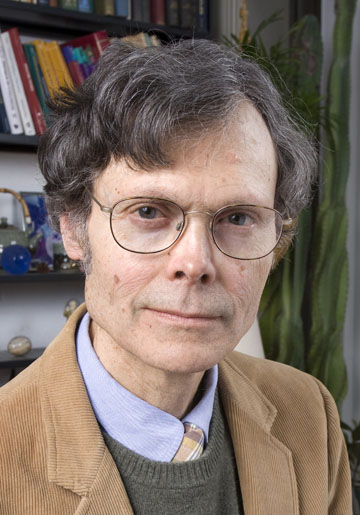
Professor of Physics
Cutts is the senior member of the experimental particle physics faculty at Brown. He was one of the founders of the D-Zero experiment at Fermilab’s Tevatron Collider, supplying the high-level trigger framework and data acquisition for the experiment.
Cutts has been involved with the LHC since the late 1990s, when he served on various Department of Energy panels reviewing the building of the CMS and another detector.
At CERN, Cutts will participate in trigger shifts for CMS. He also will take detector-monitoring shifts in the CMS remote control room at Fermilab. Cutts joined the Brown faculty in 1973. More...
Ulrich Heintz
Professor of Physics
Heintz will be involved with top quark physics and the search for new physics stemming from data generated by the Compact Muon Solenoid (CMS) experiments at the LHC.
A member of CMS since September 2008, Heintz has worked on data quality monitoring for the trigger system and on research and development for upgrades to the tracking and the trigger systems. He will travel periodically to the LHC.

